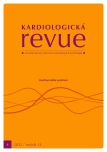-
Medical journals
- Career
Twiddler’s syndrome – an unusual cause of oversensing leading to inadequate implantable-cardioverter discharges
Authors: K. Židová; M. Novák; J. Lipoldová
Published in: Kardiol Rev Int Med 2012, 14(4): 267-271
Category: Case report - competitive
Overview
We present a case of a 74-year-old woman with the history of chronic coronary artery disease and permanent atrial fibrillation that underwent implatable cardioverter-defibrillator implantation for a secondary prevention of sudden cardiac death in July 2012. One month after the implantation the patient was referred to our department because of the 2 implantable cardioverter-defibrillator shocks. Upon interrogation 18 ventricular arrhythmia episodes were revealed – 4 in ventricular fibrillation zone, 4 in ventricular tachycardia zone and 10 episodes of nonsustained ventricular tachycardia, managed by 2 implantable cardioverter-defibrillator shocks and 5 antitachycardia pacings in total. According to the intracardial electrograms of the episodes, all the therapies were inappropriate due to atrial fibrillation waves oversensing. The cause of the oversensing was a defibrillator lead dislodgment into the right atrium which was confirmed by a chest X-ray. This case demonstrates an unusual case of oversensing leading to inappropriate implantable cardioverter-defibrillator discharges caused by the repetitive spinning of the pacemaker’s pulse generator in the pocket (Twiddler’s syndrome).
Keywords:
implantable cardioverter-defibrillator – lead dislodgement – inadequate ICD therapy
Sources
1. Porterfield JG, Porterfield LM, Kuck KH et al. Clinical performance of the St. Jude Medical Riata defibrillation lead in a large patient population. J Cardiovasc Electrophysiol 2010; 21 : 551–556.
2. Link MS, Estes NA 3rd, Griffin JJ et al. Complications of dual chamber pacemaker implantation in the elderly. Pacemaker Selection in the Elderly (PASE) Investigators. J Interv Card Electrophysiol 1998; 2 : 175–179.
3. Hayes DL, Friedman PA. Implantation-related complications. In: Hayes DL, Friedman PA (eds). Cardiac Pacing, Defibrilation and Resynchronisation. 2nd ed. Wiley-Blackwell Publishing; 2011 : 202–233.
4. Bayliss C, Beanlands D, Baired R. The Pacemaker Twiddler‘s syndrome: a new complication of implantable transvenous pacemakers. Can Med Assoc J 1968; 99 : 371–373.
5. Boyle N, Anselme F, Monahan K et al. Twiddler‘s syndrome variants in ICD patiens. Pacing Clin Electrophysiol 1998; 21 : 2685–2687.
6. Táborský M, Kautzner J, Bytešník J et al. Zásady pro implantaci kardiostimulátorů, implantabilních kardioverterů-defibrilátorů a systémů pro srdeční resynchronizační léčbu 2009. Cor Vasa 2009; 51 : 602–614.
7. Spencker S, Poppelbaum A, Mülller D. An unusual case of oversensing leading to inappropriate ICD discharges. Int J Cardiol 2008; 129: e24–e26.
8. Daubert JP, Zareba W, Cannom DS et al. MADIT II Investigators. Inappropriate implantable cardioverter-defibrillator shocks in MADIT II: frequency, mechanisms, predictors, and survival impact. J Am Coll Cardiol 2008; 51 : 1357–1365.
9. Kleemann T, Hochadel M, Strauss M et al. Comparison between atrial fibrillation-triggered implantable cardioverter-defibrillator (ICD) shocks and inappropriate shocks caused by lead failure: Different impact on prognosis in clinical practice. J Cardiovasc Electrophysiol 2012; 23 : 735–740.
10. Sweeney MO, Wathen MS, Volosin K et al. Appropriate and inappropriate ventricular therapies, quality of life, and mortality among primary and secondary prevention implantable cardioverter defibrillator patients: results from the Pacing Fast VT REduces Shock ThErapies (PainFREE Rx II) trial. Circulation 2005; 111 : 2898–2905.
Labels
Paediatric cardiology Internal medicine Cardiac surgery Cardiology
Article was published inCardiology Review

2012 Issue 4-
All articles in this issue
- Cardiorenal syndrome – from a nephrologist’s point of view
- Cardiorenal syndrome in patients with acute heart failure
- Cardiorenal syndrome with chronic heart failure – from a cardiologist‘s point of view
- Acute kidney failure and cardiovascular complication
- Chronic renal failure and cardiovascular events
- Candesartan in the treatment of hypertension and heart failure
- Stenosis of the left main coronary artery due to compression by a dilated pulmonary artery
- Twiddler’s syndrome – an unusual cause of oversensing leading to inadequate implantable-cardioverter discharges
- Affect statin myopathy reduced form of coenzyme Q10?
- Pathophysiology of cardiorenal syndrome
- Cardiology Review
- Journal archive
- Current issue
- Online only
- About the journal
Most read in this issue- Cardiorenal syndrome – from a nephrologist’s point of view
- Affect statin myopathy reduced form of coenzyme Q10?
- Cardiorenal syndrome with chronic heart failure – from a cardiologist‘s point of view
- Acute kidney failure and cardiovascular complication
Login#ADS_BOTTOM_SCRIPTS#Forgotten passwordEnter the email address that you registered with. We will send you instructions on how to set a new password.
- Career

